THE USES OF LINGUISTIC COMPETENCE AMONG GERMAN IMMIGRANTS DURING THE ESTADO NOVO IN CURITIBA: A MIGRATORY ANALYSIS IN THE LIGHT OF BOURDIEU'S CONCEPTS
DOI:
https://doi.org/10.5216/ia.v46i2.68480Abstract
This article is the result of a reflection on the uses of the mother tongue among German immigrants and their linguistic capital during the nationalization of ethnic schools during the Estado Novo period. The article seeks to establish understandings about the relationship of schools as fundamental institutions of immigrant colonies with cultural practices in Germany, and how the mandatory use of Portuguese inside and outside school spaces generated a process of struggle, disputes, and resistance ended in mobilization language as strategic resources. To analyze the strategic use of language in German immigration, we used the conceptual apparatus of Pierre Bourdieu (1996), as well as semi-structured interviews carried out with four immigrants and German descendants, allowing us to understand how language is determinant in the construction of the social world and in Power relations.
KEYWORDS: German Immigrants. Ethnic Schools. Nationalization of the Language. Linguistic Capital.
Downloads
Published
Versions
- 2025-12-15 (2)
- 2021-08-31 (1)
How to Cite
Issue
Section
License
Copyright (c) 2021 Talita Cristine Rugeri, Pedro Francisco Marchioro

This work is licensed under a Creative Commons Attribution-NonCommercial 4.0 International License.
Inter-Ação uses the Creative Commons Attribution 4.0 License for Open Access Journals (Open Archives Initiative - OAI) as the basis for the transfer of rights. Open access means making documents available on the Internet free of charge, so that users can read, download, copy, distribute, print, search, or link to the full text of documents, process them for indexing, use them as input data for software programs, or use them for any other lawful purpose, without financial, legal, or technical barriers.
Authors publishing in this journal agree to the following conditions:
1) Authors retain copyright and grant the journal the right of first publication, with the work simultaneously licensed under the Creative Commons Attribution License, which permits redistribution of the work with attribution and first publication in this journal.
2) Authors are permitted to enter into additional, separate agreements for non-exclusive distribution of the version of the work published in this journal (e.g., for publication in an institutional repository or as a book chapter), with attribution and first publication in this journal.
3) Authors are permitted and encouraged to publish and distribute their work online (e.g. in institutional repositories or on their home page) at any time before or during the editorial process, as this may generate productive changes as well as increase the impact and citation of the published work.















